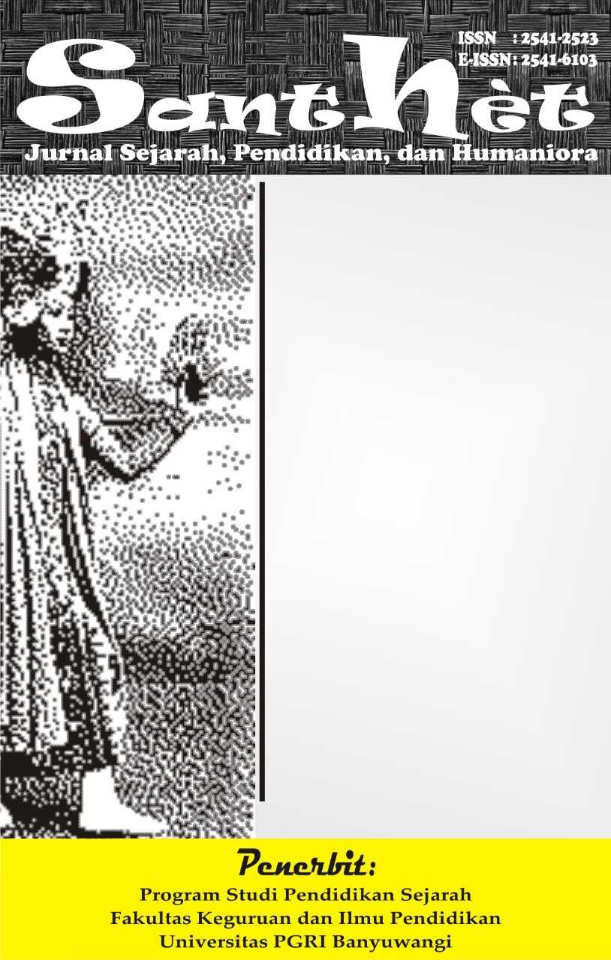Wilhelm von Humboldt Bapak Pendidikan Sejarah
DOI:
https://doi.org/10.36526/santhet.v9i5.6141Keywords:
history education, humboldt, bildung, historical cultureAbstract
This study aims to trace the origins of history education. The research question raised is: How did history emerge as a school subject? This question intrinsically also raises other related questions, such as when, where, and who the figures were who gave birth to history as a school subject. This research is a literature review using historical methods. The source collection was conducted by copying and downloading digitally available sources, including both primary and secondary sources. The results indicate that history first became a school subject in the early 19th century in Prussia (present-day Germany). The figure who initiated and implemented the policy was Wilhelm von Humboldt, who at the time was an official at the Ministry of the Interior. History education was given the responsibility to use knowledge of the past as a medium for the formation of the whole person (Bildung). This responsibility makes history education more a part of the historical culture that developed in society, rather than a subordinate to the science of history, tasked with reconstructing past events.
References
Ash, M. G. (2006). Bachelor of what, master of whom? The Humboldt myth and historical transformations of higher education in German-speaking Europe and the US. European Journal of Education, 41(2), 245–267. https://doi.org/10.1111/j.1465-3435.2006.00258.x
Biesta, G. (2009). Good education in an age of measurement: Ethics, politics, democracy. Boulder, CO: Paradigm Publishers.
Data Indonesia. (2023). Survei: Semangat nasionalisme anak muda dirasa makin turun. Data Indonesia, 17 Agustus 2023. https://dataindonesia.id/varia/detail/survei-semangat-nasionalisme-anak-muda-dirasa-makin-turun
Disdik KBB. (2022). Degradasi moral bangsa di kalangan remaja dan pelajar dilihat dari perspektif cinta tanah air dan bela negara. Disdik KBB, 10 Januari 2022. https://disdikkbb.org/news/degradasi-moral-bangsa-di-kalangan-remaja-dan-pelajar-dilihat-dari-perspektif-cinta-tanah-air-dan-bela-negara
Farmawati. (2019). Pandangan tentang semangat nasionalisme siswa. PRIMER: Jurnal Ilmiah Multidisiplin, 2(1), 53–65. https://ejournal.itka.ac.id/index.php/primer/article/download/287/250/1875
Gulo, I. N. H., Khinanti, L. D., & Manurung, K. (2024). Rendahnya sikap nasionalisme mengakibatkan meningkatnya sikap egoisme di kalangan remaja (Studi Kasus: Kelas VIII SMP N 35 Medan). Journal on Education, 6(4), 19188–19195. https://jonedu.org/index.php/joe/article/download/5919/4729
Horlacher, R. (2016). The educated subject and the German concept of Bildung: A comparative cultural history. Routledge. https://doi.org/10.4324/9781315773334
Humboldt, W. von. (1967). On the historian’s task (1821). History and Theory, 6(1), 57–71. https://doi.org/10.2307/2504336
Humboldt, W. von. (2000). Theory of Bildung. In I. Westbury, S. Hopmann, & K. Riquarts (Eds.), Teaching as a reflective practice: The German Didaktik tradition (pp. 57–61). Lawrence Erlbaum/Routledge. (Original work published 1792–1793)
Iggers, G. G. (1997). Historiography in the Twentieth Century: From Scientific Objectivity to the Postmodern Challenge. Wesleyan University Press.
Josephson, P., Karlsohn, T., & Östling, J. (Eds.). (2014). The Humboldtian tradition: Origins and legacies. Brill. https://doi.org/10.1163/9789004279423
Miyamoto, K. (2021). Bildung and the formation of historical consciousness: Revisiting Humboldt’s educational thought. Journal of Philosophy of Education, 55(4), 703–718. https://doi.org/10.1111/1467-9752.12545
Pasha, R., Nugroho, A., & Wibowo, S. (2021). Degradasi karakter pemuda Indonesia di era globalisasi. Jurnal Indigenous, 6(1), 45–58. https://jurnal.uns.ac.id/indigenous/article/download/79277/pdf
Purwanta dan Novianto. (2025). The politics of history: Indonesian high school textbooks during the New Order period 1966–1998. (Analisis diskursif terhadap produksi diskursus identitas nasional dalam buku teks sejarah).
Purwanta, H. (2024). The New Order policy toward history curriculum for the school. Jurnal Sains Sosial dan Humaniora, 8(2).
Purwanta, H., Pelu, M., & Bramastia. (2023). Deconstructing modernism discourse in Indonesian history textbooks during the military regime (1975–1998). Multidisciplinary Reviews.
Puspitarini, D. (2021). Lunturnya nasionalisme di kalangan anak muda. Muhammadiyah.or.id, 2 Oktober 2021. https://muhammadiyah.or.id/2021/10/lunturnya-nasionalisme-di-kalangan-anak-muda
Rahmawati, S. (2022). Pengaruh globalisasi terhadap lunturnya nilai nasionalisme siswa. Qistina: Jurnal Pendidikan dan Ilmu Sosial, 13(2), 201–212. https://rayyanjurnal.com/index.php/qistina/article/download/2108/pdf
Roberts, J. W. (2015). Wilhelm von Humboldt and German liberalism: A reassessment. Mosaic Press.
Rothblatt, S. (1993). The limbs of Osiris: Liberal education in the English-speaking world. In S. Rothblatt & B. Wittrock (Eds.), The European and American university since 1800: Historical and sociological essays (pp. 19–73). Cambridge University Press.
Rüsen, J. (2004). Historical consciousness: Narrative structure, moral function, and ontogenetic development. In P. Seixas (Ed.), Theorizing historical consciousness (pp. 63–85). Toronto: University of Toronto Press.
Schleiermacher, F. (1991). Occasional thoughts on universities in the German sense, with an appendix on a proposed Prussian university (1808) (T. N. Tice & E. Lawler, Trans.). Edwin Mellen.
Suryana, F. I. F., & Dewi, D. A. (2021). Lunturnya rasa nasionalisme pada anak milenial akibat arus modernisasi. Edukatif: Jurnal Ilmu Pendidikan, 3(2), 789–797. https://edukatif.org/edukatif/article/download/400/pdf
Tenorth, H.-E. (2003). Educational reform in nineteenth-century Prussia. In B. Gundem & S. Hopmann (Eds.), Didaktik and/or curriculum: An international dialogue (pp. xx–xx). Peter Lang.
Von Ranke, L. (2010). The Theory and Practice of History. London: Routledge. https://doi.org/10.4324/9780203839195





























